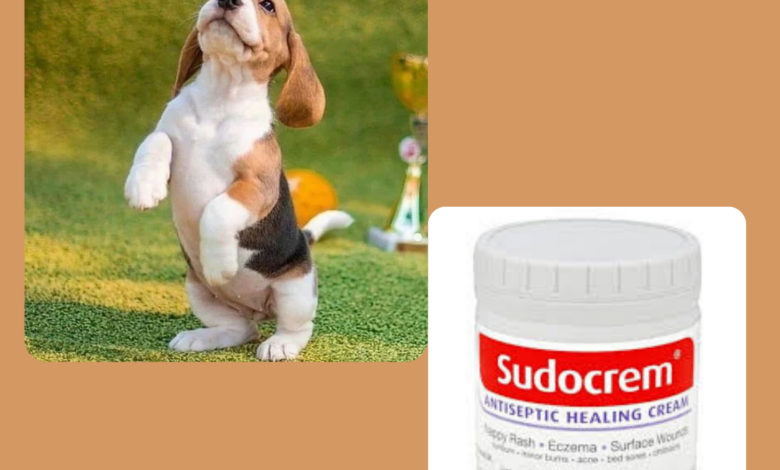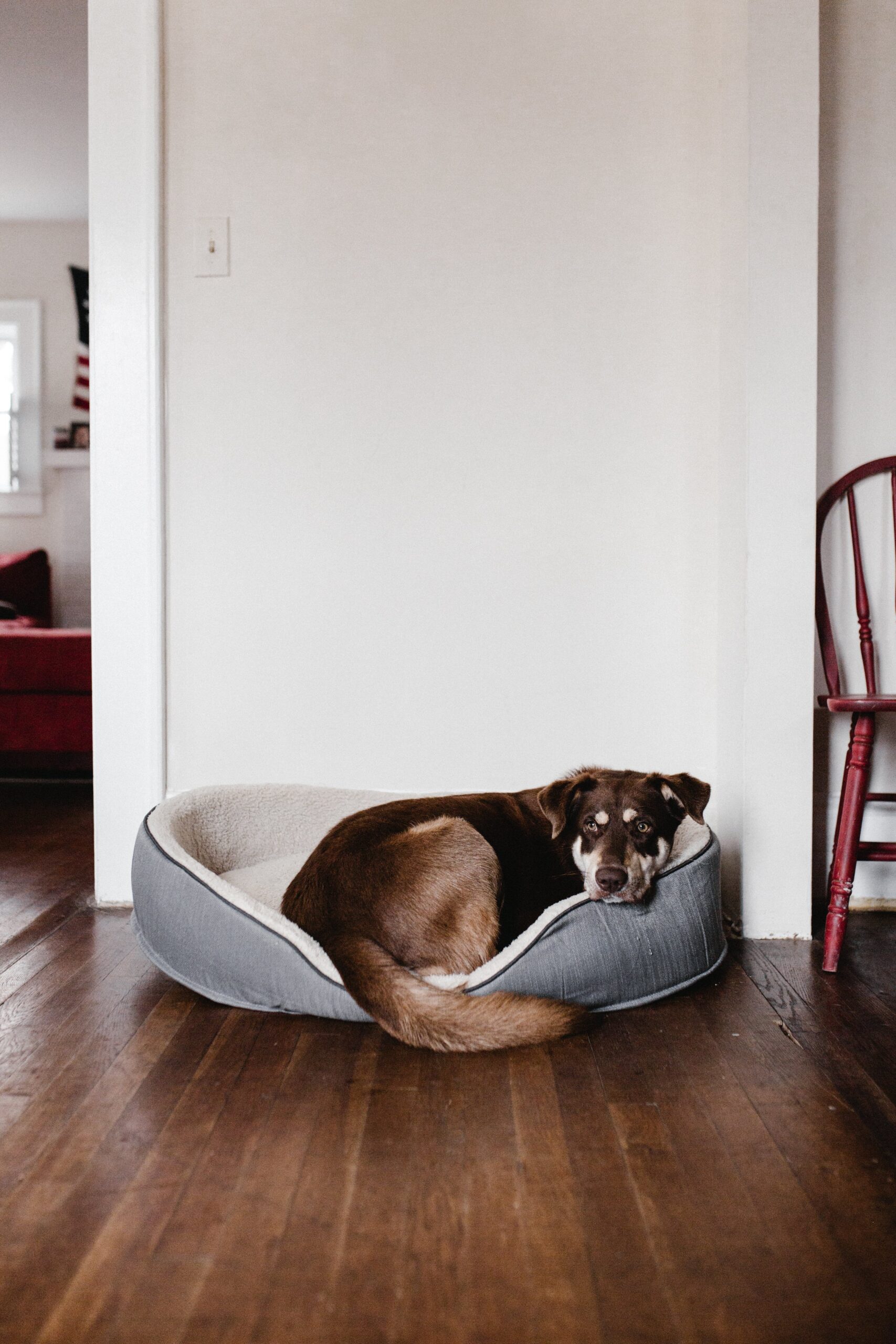Can I use Sudocrem on dogs?

Being a pet parent comes with bags of challenges, especially when it comes to keeping our furry companion healthy and happy. From pesky rashes and minor skin irritations to the occasional scrape or scratch, our furry friends often face discomfort that tugs at our heartstrings. Amidst these moments of concern, many of us have found solace in Sudocrem, a trusted ally in human skincare. As we stand in the pharmacy aisle, wondering if Sudocrem can help our dogs, doubts arise. Can Sudocrem be used on dogs? Is it safe? Will it help their skin problems?
it is not recommended to use Sudocrem on dogs without consulting a. While Sudocrem is a commonly used topical cream for treating various skin conditions in humans, its suitability for use on dogs is uncertain. Dogs’ skins are totally different and highly sensitive compared to humans, which means that what works for us may not be safe or effective for them.
Can I use Sudocrem on dogs?
As pet parents, we often extend our love by treating our beloved companions with the same products we use ourselves. However, when it comes to Sudocrem, it’s essential to never try it or if you do choose to do it with caution.
While it may seem like a natural choice for treating our furry friends’ rashes or wounds, it’s never advisable to apply Sudocrem to areas where your pet can lick or ingest it. Because it contains several ingredients, including toxic substances like zinc oxide, benzyl alcohol, benzyl benzoate, and lanolin.
It may not affect their skin but they might mistakenly ingest it, as most areas where dogs develop rashes or wounds are easily accessible to their tongues. Unless you will buy a Soft Mesh Dog Muzzle.
Zinc Oxide
Zinc oxide, often found in products like Sudocrem, can be toxic to dogs due to its potential to cause gastrointestinal upset and irritation. Ingestion of zinc oxide can lead to symptoms such as vomiting, diarrhea, and abdominal discomfort. Additionally, in severe cases, it can damage red blood cells, resulting in anemia. Dogs may exhibit signs of weakness, lethargy, pale gums, and rapid breathing if they develop anemia due to zinc oxide toxicity.
Zinc Oxide Products
- Diaper rash creams (e.g., Sudocrem, Desitin)
- Sunscreen lotions and creams
- Calamine lotion (for skin irritation)
- Benzyl alcohol
Benzyl alcohol
Benzyl alcohol, commonly used as a preservative in skincare products, poses risks to dogs if ingested. This ingredient can lead to gastrointestinal upset, including vomiting and diarrhea. In some cases, ingestion of benzyl alcohol may also cause weakness, difficulty breathing, and central nervous system depression in dogs.
Immediate veterinary attention is necessary if a dog shows any signs of benzyl alcohol toxicity to prevent further complications.
Benzyl Alcohol Products
- Skincare products (e.g., lotions, creams, ointments)
- Hair care products (e.g., shampoos, conditioners)
- Topical medications (e.g., antiseptics, anti-itch creams)
Benzyl benzoate
Benzyl benzoate, although less frequently encountered in skincare products, can still be harmful to dogs if consumed. Ingestion of benzyl benzoate may result in gastrointestinal irritation, leading to symptoms such as vomiting, diarrhea, and abdominal pain. Additionally, prolonged exposure to high doses of benzyl benzoate may potentially cause liver damage in dogs, highlighting the importance of prompt veterinary care if ingestion occurs.
Benzyl Benzoate That’s Toxic to Dogs
- Topical medications (e.g., scabies treatments, antifungal creams)
- Insect repellents
- Perfumes and fragrances
Lanolin
Lanolin, a common ingredient in skincare products known for its moisturizing properties, can also cause problems if ingested by dogs. While lanolin is generally considered to have low toxicity, it may still lead to gastrointestinal disturbances in dogs, such as vomiting and diarrhea. Some dogs may also develop allergic reactions to lanolin, resulting in skin irritation, itching, or redness. If a dog ingests lanolin-containing products, it’s essential to monitor them closely for any adverse reactions and seek veterinary advice if needed.
Lanolin Products
- Moisturizing creams and lotions (e.g., nipple creams for breastfeeding mothers)
- Lip balms and lipsticks
- Diaper rash creams
- Hair care products (e.g., conditioners, styling products)
Best creams to put on my dog’s sore?
Even though Sudocrem is not recommended for your pet’s skin due to potential ingestion risks and toxicity, there are safer alternatives available to soothe your furry friend’s sore or irritated skin.
Opting for veterinary-formulated creams specifically designed for dog use is a safer choice.
Also, check out Products like Vetericyn Plus Antimicrobial Hydrogel or Zymox Topical Cream are good choices, as they are formulated with ingredients that are both safe and effective for dogs, offering relief for common skin issues such as rashes, hot spots, or minor wounds.
If you buying make sure you getting it from a reputable source, and always read reviews to know if the product is safe for your dog.
How to use antiseptic cream for dogs?
When using antiseptic cream for dogs, it’s essential to follow these steps for proper application:
1. Clean the Affected Area: Before applying the antiseptic cream, gently clean the affected area with mild soap and water. Pat the area dry with a clean towel.
2. Apply a Thin Layer: Use a small amount of the antiseptic cream and apply it directly to the affected area. Be sure to spread the cream evenly in a thin layer to cover the entire area needing treatment.
3. Avoid Licking or Ingestion:** Keep an eye on your dog to prevent them from licking or ingesting the cream. If necessary, you can use an Elizabethan collar (cone) to prevent your dog from accessing the treated area.
4. Follow Product Instructions:** Follow the instructions provided on the product label regarding frequency of application and duration of treatment. Some creams may need to be applied multiple times per day, while others may require less frequent application.
5. Monitor for Improvement:** Keep an eye on the treated area for any signs of improvement or worsening. If you notice any adverse reactions or if the condition does not improve, discontinue the use of the cream and consult your veterinarian for further guidance.
Can I use Savlon on dogs?
While it may seem like a convenient option for treating minor cuts or skin irritations in pets, just Sudocrem Savlon contains ingredients that could potentially be harmful if your dog mistakenly tastes it.
It’s best to avoid using Savlon on your dog and opt for products specifically formulated for canine use. If your dog has a minor wound or skin issue, it is cool to try Triple antibiotic ointments containing bacitracin, neomycin, and polymyxin B.
CHECK OUT THESE WONDERFUL PET TOOLS





